3806NRS Prof Nursing Practice: RN Standards, Ethics, and Safety
VerifiedAdded on 2023/06/10
|12
|2929
|288
Essay
AI Summary
This essay provides a comprehensive analysis of professional nursing practice, focusing on the Registered Nurse Standards for Practice, the Code of Ethics for Nurses, and the importance of safety and quality in healthcare. The first component delves into the application of the Registered Nurse Standards, emphasizing critical thinking, evidence-based practice, reflective practice, and compliance with regulations. The second component examines the Code of Ethics, highlighting the value of quality nursing care, accountability, and ethical decision-making in patient advocacy and policy reform. The final component addresses the significance of safety and quality in healthcare, discussing the Australian Commission on Safety and Quality in Health Care's framework and the need for continuous improvement in patient safety and satisfaction. The essay concludes by reflecting on the increasing demands on healthcare services and the importance of preventing errors and promoting a culture of safety.
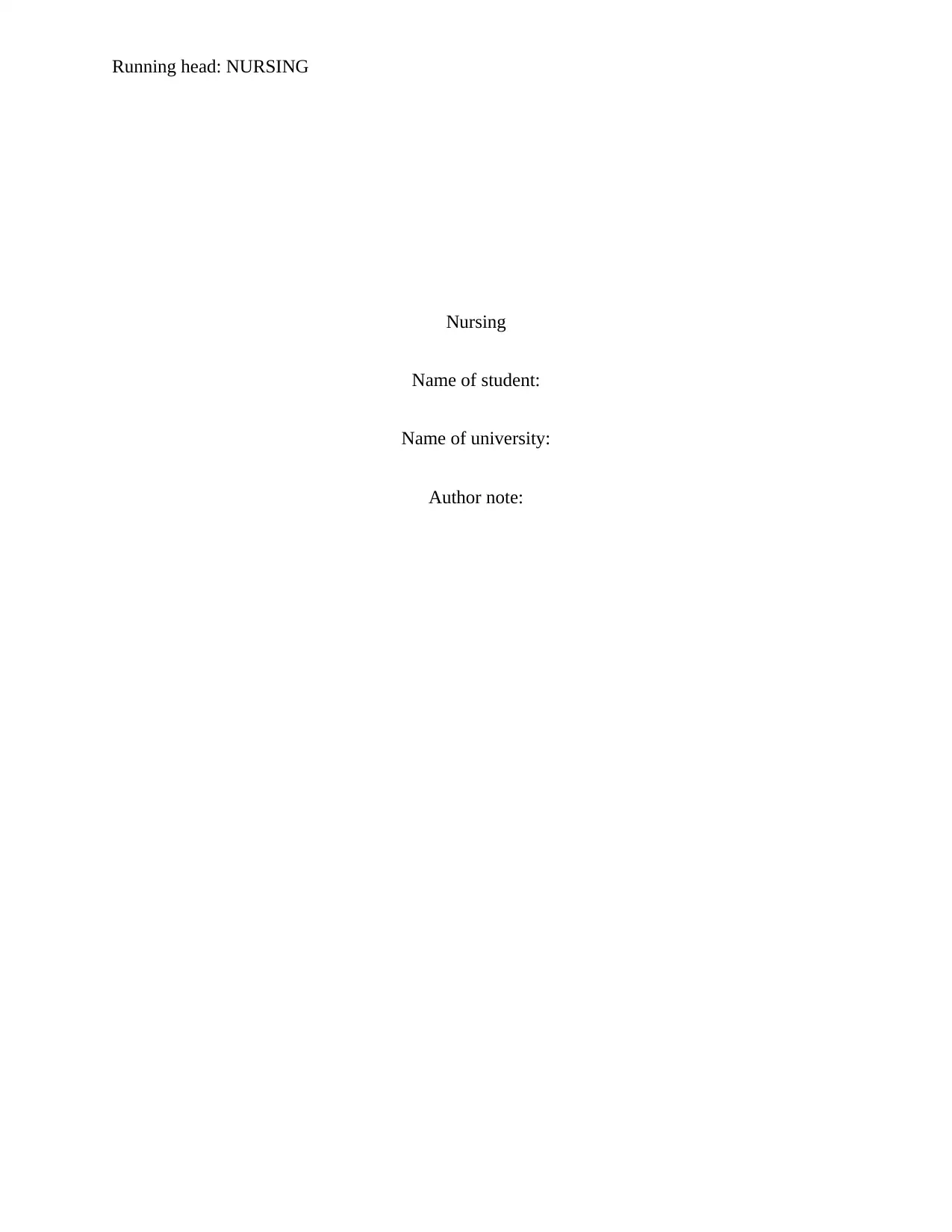
Running head: NURSING
Nursing
Name of student:
Name of university:
Author note:
Nursing
Name of student:
Name of university:
Author note:
Paraphrase This Document
Need a fresh take? Get an instant paraphrase of this document with our AI Paraphraser
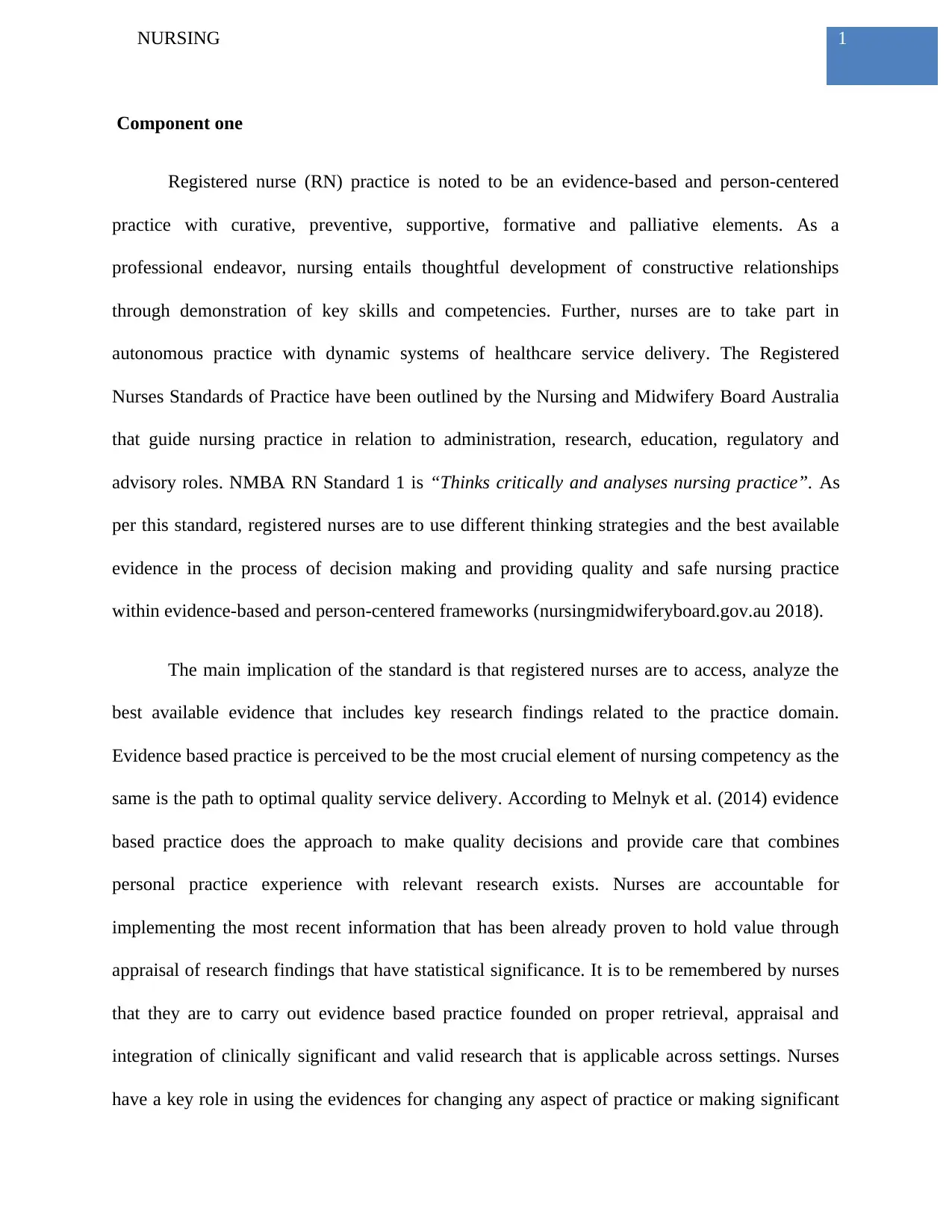
1NURSING
Component one
Registered nurse (RN) practice is noted to be an evidence-based and person-centered
practice with curative, preventive, supportive, formative and palliative elements. As a
professional endeavor, nursing entails thoughtful development of constructive relationships
through demonstration of key skills and competencies. Further, nurses are to take part in
autonomous practice with dynamic systems of healthcare service delivery. The Registered
Nurses Standards of Practice have been outlined by the Nursing and Midwifery Board Australia
that guide nursing practice in relation to administration, research, education, regulatory and
advisory roles. NMBA RN Standard 1 is “Thinks critically and analyses nursing practice”. As
per this standard, registered nurses are to use different thinking strategies and the best available
evidence in the process of decision making and providing quality and safe nursing practice
within evidence-based and person-centered frameworks (nursingmidwiferyboard.gov.au 2018).
The main implication of the standard is that registered nurses are to access, analyze the
best available evidence that includes key research findings related to the practice domain.
Evidence based practice is perceived to be the most crucial element of nursing competency as the
same is the path to optimal quality service delivery. According to Melnyk et al. (2014) evidence
based practice does the approach to make quality decisions and provide care that combines
personal practice experience with relevant research exists. Nurses are accountable for
implementing the most recent information that has been already proven to hold value through
appraisal of research findings that have statistical significance. It is to be remembered by nurses
that they are to carry out evidence based practice founded on proper retrieval, appraisal and
integration of clinically significant and valid research that is applicable across settings. Nurses
have a key role in using the evidences for changing any aspect of practice or making significant
Component one
Registered nurse (RN) practice is noted to be an evidence-based and person-centered
practice with curative, preventive, supportive, formative and palliative elements. As a
professional endeavor, nursing entails thoughtful development of constructive relationships
through demonstration of key skills and competencies. Further, nurses are to take part in
autonomous practice with dynamic systems of healthcare service delivery. The Registered
Nurses Standards of Practice have been outlined by the Nursing and Midwifery Board Australia
that guide nursing practice in relation to administration, research, education, regulatory and
advisory roles. NMBA RN Standard 1 is “Thinks critically and analyses nursing practice”. As
per this standard, registered nurses are to use different thinking strategies and the best available
evidence in the process of decision making and providing quality and safe nursing practice
within evidence-based and person-centered frameworks (nursingmidwiferyboard.gov.au 2018).
The main implication of the standard is that registered nurses are to access, analyze the
best available evidence that includes key research findings related to the practice domain.
Evidence based practice is perceived to be the most crucial element of nursing competency as the
same is the path to optimal quality service delivery. According to Melnyk et al. (2014) evidence
based practice does the approach to make quality decisions and provide care that combines
personal practice experience with relevant research exists. Nurses are accountable for
implementing the most recent information that has been already proven to hold value through
appraisal of research findings that have statistical significance. It is to be remembered by nurses
that they are to carry out evidence based practice founded on proper retrieval, appraisal and
integration of clinically significant and valid research that is applicable across settings. Nurses
have a key role in using the evidences for changing any aspect of practice or making significant
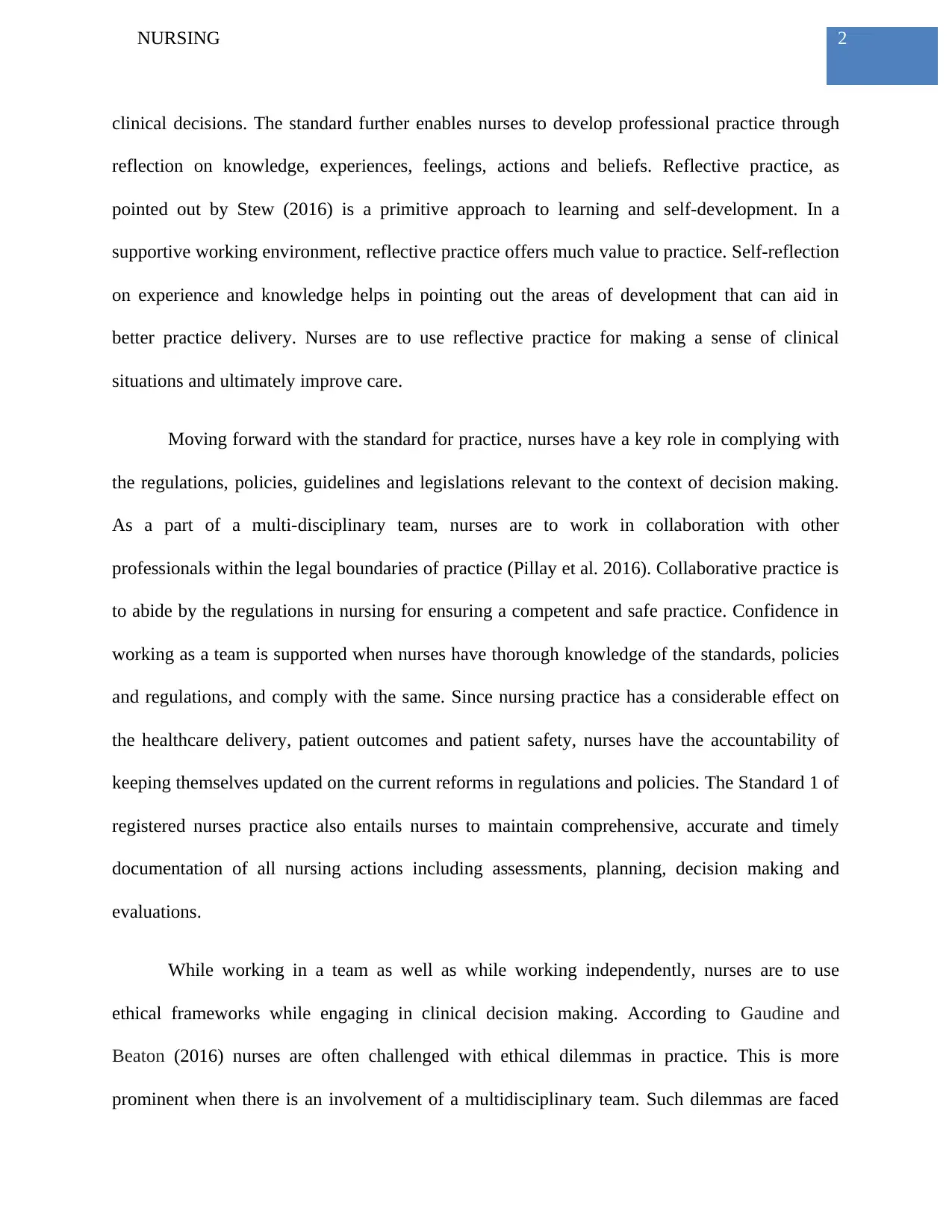
2NURSING
clinical decisions. The standard further enables nurses to develop professional practice through
reflection on knowledge, experiences, feelings, actions and beliefs. Reflective practice, as
pointed out by Stew (2016) is a primitive approach to learning and self-development. In a
supportive working environment, reflective practice offers much value to practice. Self-reflection
on experience and knowledge helps in pointing out the areas of development that can aid in
better practice delivery. Nurses are to use reflective practice for making a sense of clinical
situations and ultimately improve care.
Moving forward with the standard for practice, nurses have a key role in complying with
the regulations, policies, guidelines and legislations relevant to the context of decision making.
As a part of a multi-disciplinary team, nurses are to work in collaboration with other
professionals within the legal boundaries of practice (Pillay et al. 2016). Collaborative practice is
to abide by the regulations in nursing for ensuring a competent and safe practice. Confidence in
working as a team is supported when nurses have thorough knowledge of the standards, policies
and regulations, and comply with the same. Since nursing practice has a considerable effect on
the healthcare delivery, patient outcomes and patient safety, nurses have the accountability of
keeping themselves updated on the current reforms in regulations and policies. The Standard 1 of
registered nurses practice also entails nurses to maintain comprehensive, accurate and timely
documentation of all nursing actions including assessments, planning, decision making and
evaluations.
While working in a team as well as while working independently, nurses are to use
ethical frameworks while engaging in clinical decision making. According to Gaudine and
Beaton (2016) nurses are often challenged with ethical dilemmas in practice. This is more
prominent when there is an involvement of a multidisciplinary team. Such dilemmas are faced
clinical decisions. The standard further enables nurses to develop professional practice through
reflection on knowledge, experiences, feelings, actions and beliefs. Reflective practice, as
pointed out by Stew (2016) is a primitive approach to learning and self-development. In a
supportive working environment, reflective practice offers much value to practice. Self-reflection
on experience and knowledge helps in pointing out the areas of development that can aid in
better practice delivery. Nurses are to use reflective practice for making a sense of clinical
situations and ultimately improve care.
Moving forward with the standard for practice, nurses have a key role in complying with
the regulations, policies, guidelines and legislations relevant to the context of decision making.
As a part of a multi-disciplinary team, nurses are to work in collaboration with other
professionals within the legal boundaries of practice (Pillay et al. 2016). Collaborative practice is
to abide by the regulations in nursing for ensuring a competent and safe practice. Confidence in
working as a team is supported when nurses have thorough knowledge of the standards, policies
and regulations, and comply with the same. Since nursing practice has a considerable effect on
the healthcare delivery, patient outcomes and patient safety, nurses have the accountability of
keeping themselves updated on the current reforms in regulations and policies. The Standard 1 of
registered nurses practice also entails nurses to maintain comprehensive, accurate and timely
documentation of all nursing actions including assessments, planning, decision making and
evaluations.
While working in a team as well as while working independently, nurses are to use
ethical frameworks while engaging in clinical decision making. According to Gaudine and
Beaton (2016) nurses are often challenged with ethical dilemmas in practice. This is more
prominent when there is an involvement of a multidisciplinary team. Such dilemmas are faced
⊘ This is a preview!⊘
Do you want full access?
Subscribe today to unlock all pages.

Trusted by 1+ million students worldwide
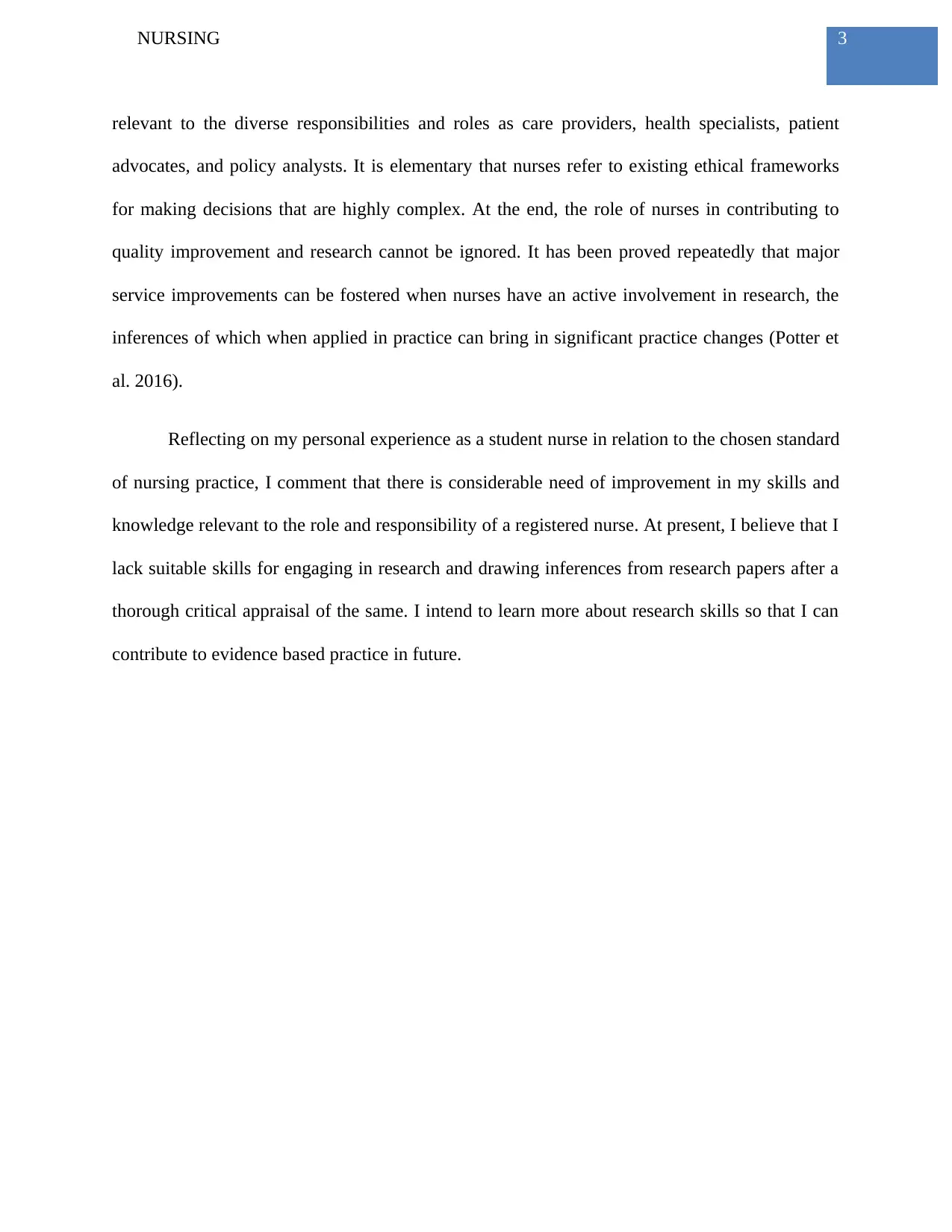
3NURSING
relevant to the diverse responsibilities and roles as care providers, health specialists, patient
advocates, and policy analysts. It is elementary that nurses refer to existing ethical frameworks
for making decisions that are highly complex. At the end, the role of nurses in contributing to
quality improvement and research cannot be ignored. It has been proved repeatedly that major
service improvements can be fostered when nurses have an active involvement in research, the
inferences of which when applied in practice can bring in significant practice changes (Potter et
al. 2016).
Reflecting on my personal experience as a student nurse in relation to the chosen standard
of nursing practice, I comment that there is considerable need of improvement in my skills and
knowledge relevant to the role and responsibility of a registered nurse. At present, I believe that I
lack suitable skills for engaging in research and drawing inferences from research papers after a
thorough critical appraisal of the same. I intend to learn more about research skills so that I can
contribute to evidence based practice in future.
relevant to the diverse responsibilities and roles as care providers, health specialists, patient
advocates, and policy analysts. It is elementary that nurses refer to existing ethical frameworks
for making decisions that are highly complex. At the end, the role of nurses in contributing to
quality improvement and research cannot be ignored. It has been proved repeatedly that major
service improvements can be fostered when nurses have an active involvement in research, the
inferences of which when applied in practice can bring in significant practice changes (Potter et
al. 2016).
Reflecting on my personal experience as a student nurse in relation to the chosen standard
of nursing practice, I comment that there is considerable need of improvement in my skills and
knowledge relevant to the role and responsibility of a registered nurse. At present, I believe that I
lack suitable skills for engaging in research and drawing inferences from research papers after a
thorough critical appraisal of the same. I intend to learn more about research skills so that I can
contribute to evidence based practice in future.
Paraphrase This Document
Need a fresh take? Get an instant paraphrase of this document with our AI Paraphraser
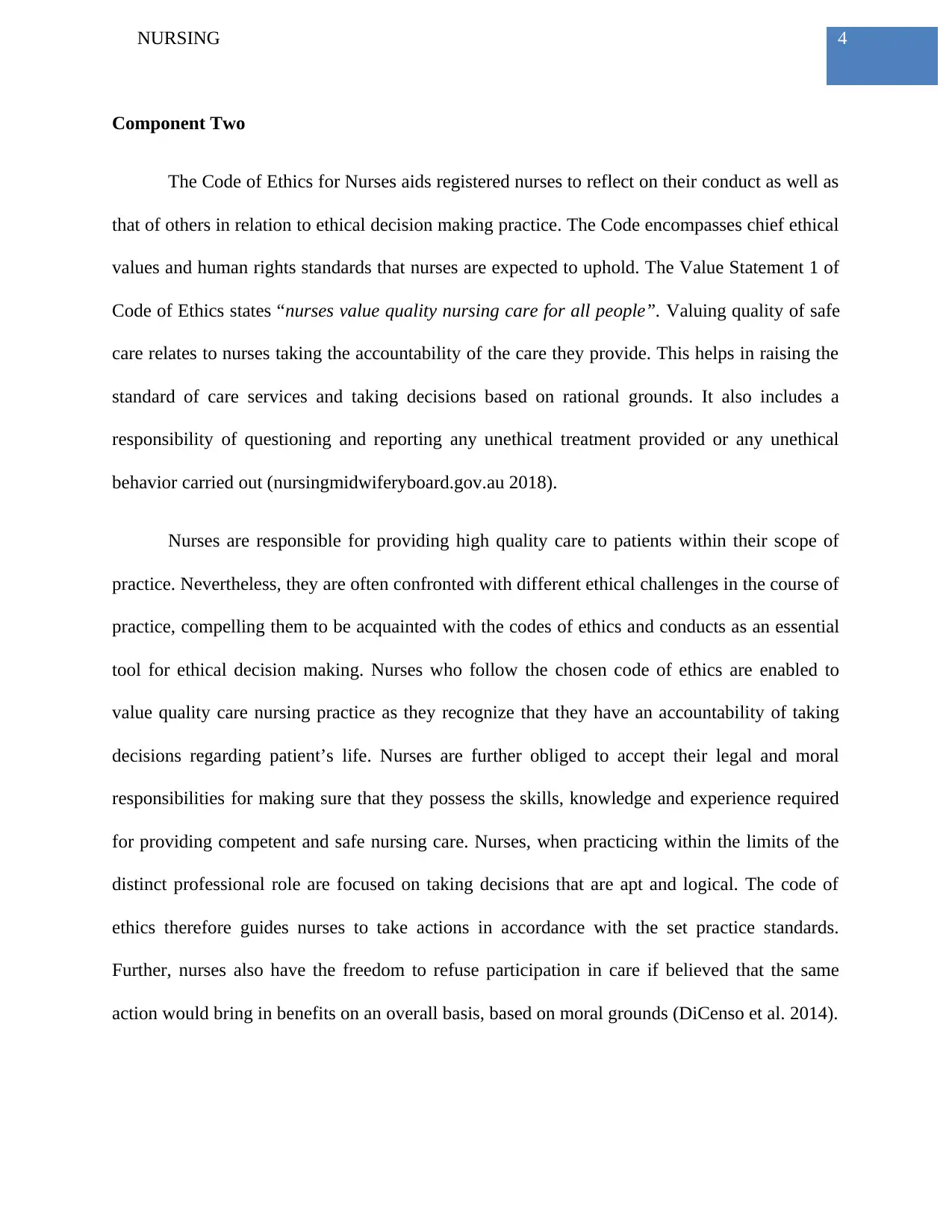
4NURSING
Component Two
The Code of Ethics for Nurses aids registered nurses to reflect on their conduct as well as
that of others in relation to ethical decision making practice. The Code encompasses chief ethical
values and human rights standards that nurses are expected to uphold. The Value Statement 1 of
Code of Ethics states “nurses value quality nursing care for all people”. Valuing quality of safe
care relates to nurses taking the accountability of the care they provide. This helps in raising the
standard of care services and taking decisions based on rational grounds. It also includes a
responsibility of questioning and reporting any unethical treatment provided or any unethical
behavior carried out (nursingmidwiferyboard.gov.au 2018).
Nurses are responsible for providing high quality care to patients within their scope of
practice. Nevertheless, they are often confronted with different ethical challenges in the course of
practice, compelling them to be acquainted with the codes of ethics and conducts as an essential
tool for ethical decision making. Nurses who follow the chosen code of ethics are enabled to
value quality care nursing practice as they recognize that they have an accountability of taking
decisions regarding patient’s life. Nurses are further obliged to accept their legal and moral
responsibilities for making sure that they possess the skills, knowledge and experience required
for providing competent and safe nursing care. Nurses, when practicing within the limits of the
distinct professional role are focused on taking decisions that are apt and logical. The code of
ethics therefore guides nurses to take actions in accordance with the set practice standards.
Further, nurses also have the freedom to refuse participation in care if believed that the same
action would bring in benefits on an overall basis, based on moral grounds (DiCenso et al. 2014).
Component Two
The Code of Ethics for Nurses aids registered nurses to reflect on their conduct as well as
that of others in relation to ethical decision making practice. The Code encompasses chief ethical
values and human rights standards that nurses are expected to uphold. The Value Statement 1 of
Code of Ethics states “nurses value quality nursing care for all people”. Valuing quality of safe
care relates to nurses taking the accountability of the care they provide. This helps in raising the
standard of care services and taking decisions based on rational grounds. It also includes a
responsibility of questioning and reporting any unethical treatment provided or any unethical
behavior carried out (nursingmidwiferyboard.gov.au 2018).
Nurses are responsible for providing high quality care to patients within their scope of
practice. Nevertheless, they are often confronted with different ethical challenges in the course of
practice, compelling them to be acquainted with the codes of ethics and conducts as an essential
tool for ethical decision making. Nurses who follow the chosen code of ethics are enabled to
value quality care nursing practice as they recognize that they have an accountability of taking
decisions regarding patient’s life. Nurses are further obliged to accept their legal and moral
responsibilities for making sure that they possess the skills, knowledge and experience required
for providing competent and safe nursing care. Nurses, when practicing within the limits of the
distinct professional role are focused on taking decisions that are apt and logical. The code of
ethics therefore guides nurses to take actions in accordance with the set practice standards.
Further, nurses also have the freedom to refuse participation in care if believed that the same
action would bring in benefits on an overall basis, based on moral grounds (DiCenso et al. 2014).
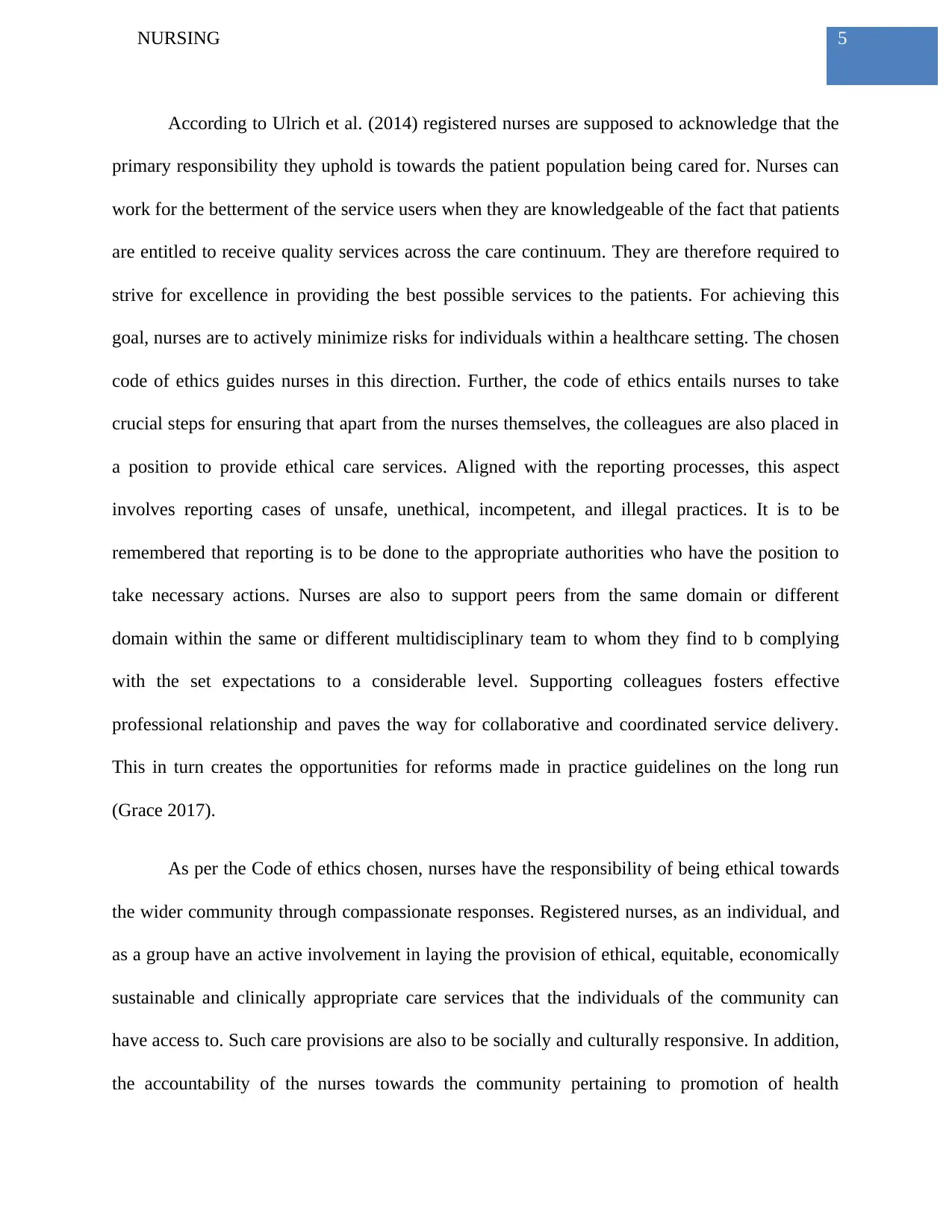
5NURSING
According to Ulrich et al. (2014) registered nurses are supposed to acknowledge that the
primary responsibility they uphold is towards the patient population being cared for. Nurses can
work for the betterment of the service users when they are knowledgeable of the fact that patients
are entitled to receive quality services across the care continuum. They are therefore required to
strive for excellence in providing the best possible services to the patients. For achieving this
goal, nurses are to actively minimize risks for individuals within a healthcare setting. The chosen
code of ethics guides nurses in this direction. Further, the code of ethics entails nurses to take
crucial steps for ensuring that apart from the nurses themselves, the colleagues are also placed in
a position to provide ethical care services. Aligned with the reporting processes, this aspect
involves reporting cases of unsafe, unethical, incompetent, and illegal practices. It is to be
remembered that reporting is to be done to the appropriate authorities who have the position to
take necessary actions. Nurses are also to support peers from the same domain or different
domain within the same or different multidisciplinary team to whom they find to b complying
with the set expectations to a considerable level. Supporting colleagues fosters effective
professional relationship and paves the way for collaborative and coordinated service delivery.
This in turn creates the opportunities for reforms made in practice guidelines on the long run
(Grace 2017).
As per the Code of ethics chosen, nurses have the responsibility of being ethical towards
the wider community through compassionate responses. Registered nurses, as an individual, and
as a group have an active involvement in laying the provision of ethical, equitable, economically
sustainable and clinically appropriate care services that the individuals of the community can
have access to. Such care provisions are also to be socially and culturally responsive. In addition,
the accountability of the nurses towards the community pertaining to promotion of health
According to Ulrich et al. (2014) registered nurses are supposed to acknowledge that the
primary responsibility they uphold is towards the patient population being cared for. Nurses can
work for the betterment of the service users when they are knowledgeable of the fact that patients
are entitled to receive quality services across the care continuum. They are therefore required to
strive for excellence in providing the best possible services to the patients. For achieving this
goal, nurses are to actively minimize risks for individuals within a healthcare setting. The chosen
code of ethics guides nurses in this direction. Further, the code of ethics entails nurses to take
crucial steps for ensuring that apart from the nurses themselves, the colleagues are also placed in
a position to provide ethical care services. Aligned with the reporting processes, this aspect
involves reporting cases of unsafe, unethical, incompetent, and illegal practices. It is to be
remembered that reporting is to be done to the appropriate authorities who have the position to
take necessary actions. Nurses are also to support peers from the same domain or different
domain within the same or different multidisciplinary team to whom they find to b complying
with the set expectations to a considerable level. Supporting colleagues fosters effective
professional relationship and paves the way for collaborative and coordinated service delivery.
This in turn creates the opportunities for reforms made in practice guidelines on the long run
(Grace 2017).
As per the Code of ethics chosen, nurses have the responsibility of being ethical towards
the wider community through compassionate responses. Registered nurses, as an individual, and
as a group have an active involvement in laying the provision of ethical, equitable, economically
sustainable and clinically appropriate care services that the individuals of the community can
have access to. Such care provisions are also to be socially and culturally responsive. In addition,
the accountability of the nurses towards the community pertaining to promotion of health
⊘ This is a preview!⊘
Do you want full access?
Subscribe today to unlock all pages.

Trusted by 1+ million students worldwide
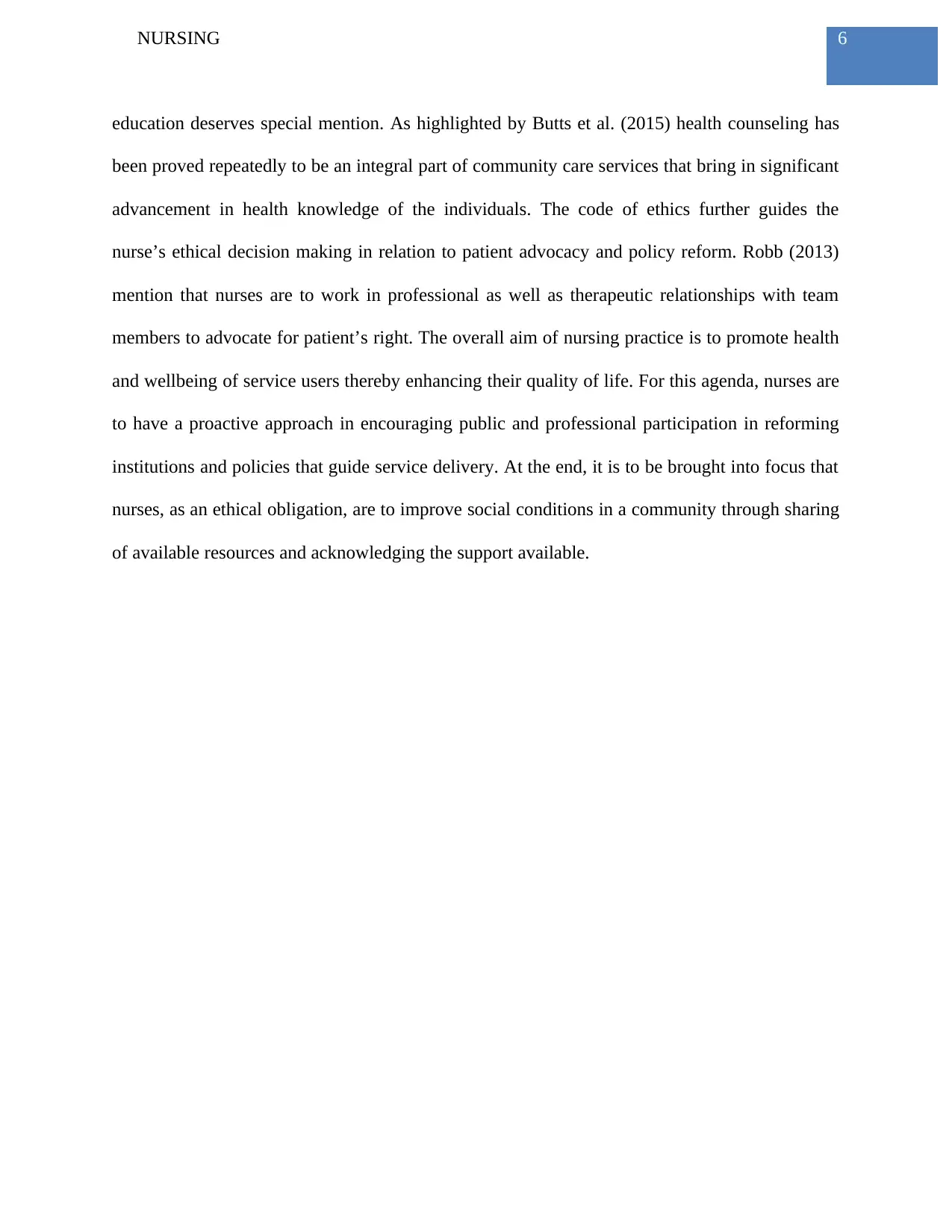
6NURSING
education deserves special mention. As highlighted by Butts et al. (2015) health counseling has
been proved repeatedly to be an integral part of community care services that bring in significant
advancement in health knowledge of the individuals. The code of ethics further guides the
nurse’s ethical decision making in relation to patient advocacy and policy reform. Robb (2013)
mention that nurses are to work in professional as well as therapeutic relationships with team
members to advocate for patient’s right. The overall aim of nursing practice is to promote health
and wellbeing of service users thereby enhancing their quality of life. For this agenda, nurses are
to have a proactive approach in encouraging public and professional participation in reforming
institutions and policies that guide service delivery. At the end, it is to be brought into focus that
nurses, as an ethical obligation, are to improve social conditions in a community through sharing
of available resources and acknowledging the support available.
education deserves special mention. As highlighted by Butts et al. (2015) health counseling has
been proved repeatedly to be an integral part of community care services that bring in significant
advancement in health knowledge of the individuals. The code of ethics further guides the
nurse’s ethical decision making in relation to patient advocacy and policy reform. Robb (2013)
mention that nurses are to work in professional as well as therapeutic relationships with team
members to advocate for patient’s right. The overall aim of nursing practice is to promote health
and wellbeing of service users thereby enhancing their quality of life. For this agenda, nurses are
to have a proactive approach in encouraging public and professional participation in reforming
institutions and policies that guide service delivery. At the end, it is to be brought into focus that
nurses, as an ethical obligation, are to improve social conditions in a community through sharing
of available resources and acknowledging the support available.
Paraphrase This Document
Need a fresh take? Get an instant paraphrase of this document with our AI Paraphraser
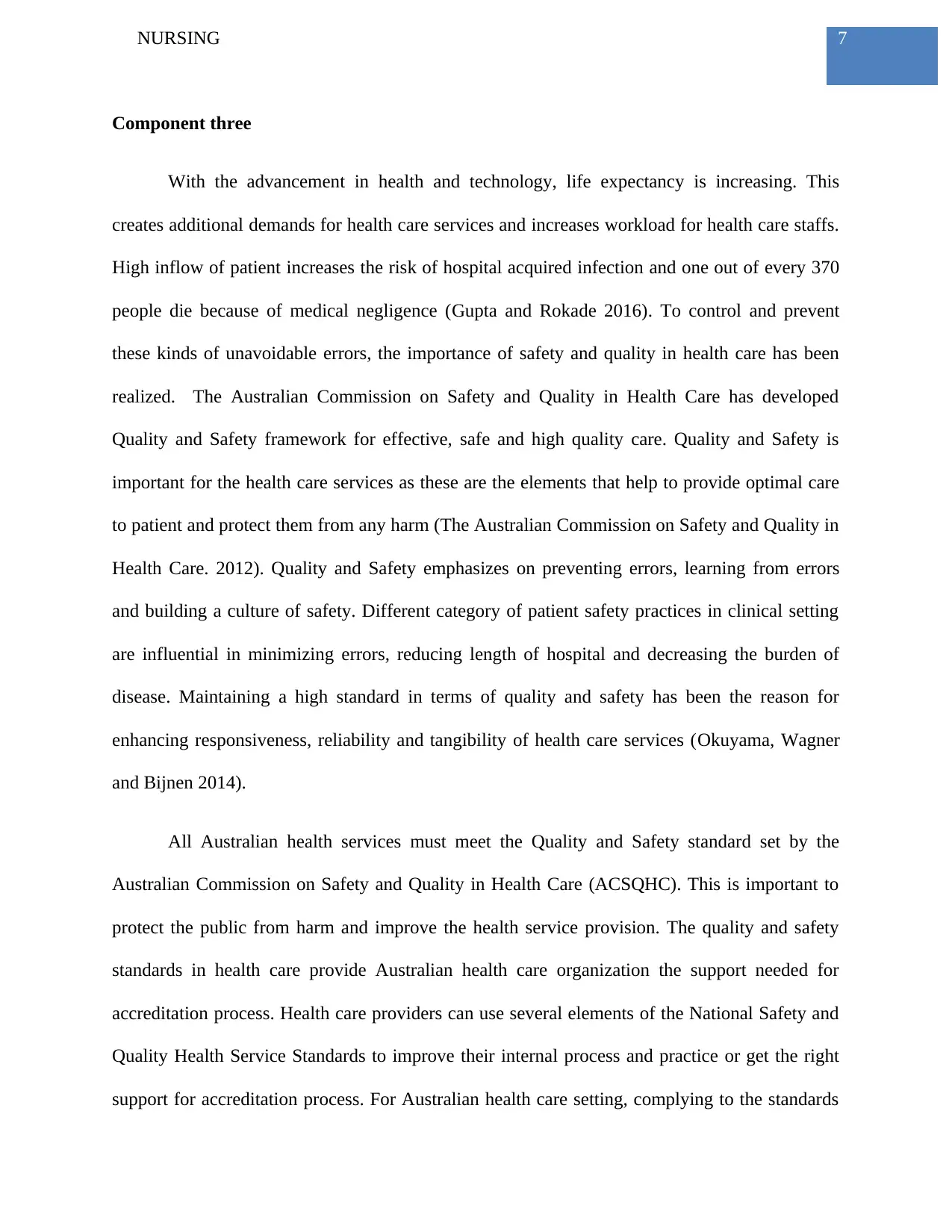
7NURSING
Component three
With the advancement in health and technology, life expectancy is increasing. This
creates additional demands for health care services and increases workload for health care staffs.
High inflow of patient increases the risk of hospital acquired infection and one out of every 370
people die because of medical negligence (Gupta and Rokade 2016). To control and prevent
these kinds of unavoidable errors, the importance of safety and quality in health care has been
realized. The Australian Commission on Safety and Quality in Health Care has developed
Quality and Safety framework for effective, safe and high quality care. Quality and Safety is
important for the health care services as these are the elements that help to provide optimal care
to patient and protect them from any harm (The Australian Commission on Safety and Quality in
Health Care. 2012). Quality and Safety emphasizes on preventing errors, learning from errors
and building a culture of safety. Different category of patient safety practices in clinical setting
are influential in minimizing errors, reducing length of hospital and decreasing the burden of
disease. Maintaining a high standard in terms of quality and safety has been the reason for
enhancing responsiveness, reliability and tangibility of health care services (Okuyama, Wagner
and Bijnen 2014).
All Australian health services must meet the Quality and Safety standard set by the
Australian Commission on Safety and Quality in Health Care (ACSQHC). This is important to
protect the public from harm and improve the health service provision. The quality and safety
standards in health care provide Australian health care organization the support needed for
accreditation process. Health care providers can use several elements of the National Safety and
Quality Health Service Standards to improve their internal process and practice or get the right
support for accreditation process. For Australian health care setting, complying to the standards
Component three
With the advancement in health and technology, life expectancy is increasing. This
creates additional demands for health care services and increases workload for health care staffs.
High inflow of patient increases the risk of hospital acquired infection and one out of every 370
people die because of medical negligence (Gupta and Rokade 2016). To control and prevent
these kinds of unavoidable errors, the importance of safety and quality in health care has been
realized. The Australian Commission on Safety and Quality in Health Care has developed
Quality and Safety framework for effective, safe and high quality care. Quality and Safety is
important for the health care services as these are the elements that help to provide optimal care
to patient and protect them from any harm (The Australian Commission on Safety and Quality in
Health Care. 2012). Quality and Safety emphasizes on preventing errors, learning from errors
and building a culture of safety. Different category of patient safety practices in clinical setting
are influential in minimizing errors, reducing length of hospital and decreasing the burden of
disease. Maintaining a high standard in terms of quality and safety has been the reason for
enhancing responsiveness, reliability and tangibility of health care services (Okuyama, Wagner
and Bijnen 2014).
All Australian health services must meet the Quality and Safety standard set by the
Australian Commission on Safety and Quality in Health Care (ACSQHC). This is important to
protect the public from harm and improve the health service provision. The quality and safety
standards in health care provide Australian health care organization the support needed for
accreditation process. Health care providers can use several elements of the National Safety and
Quality Health Service Standards to improve their internal process and practice or get the right
support for accreditation process. For Australian health care setting, complying to the standards
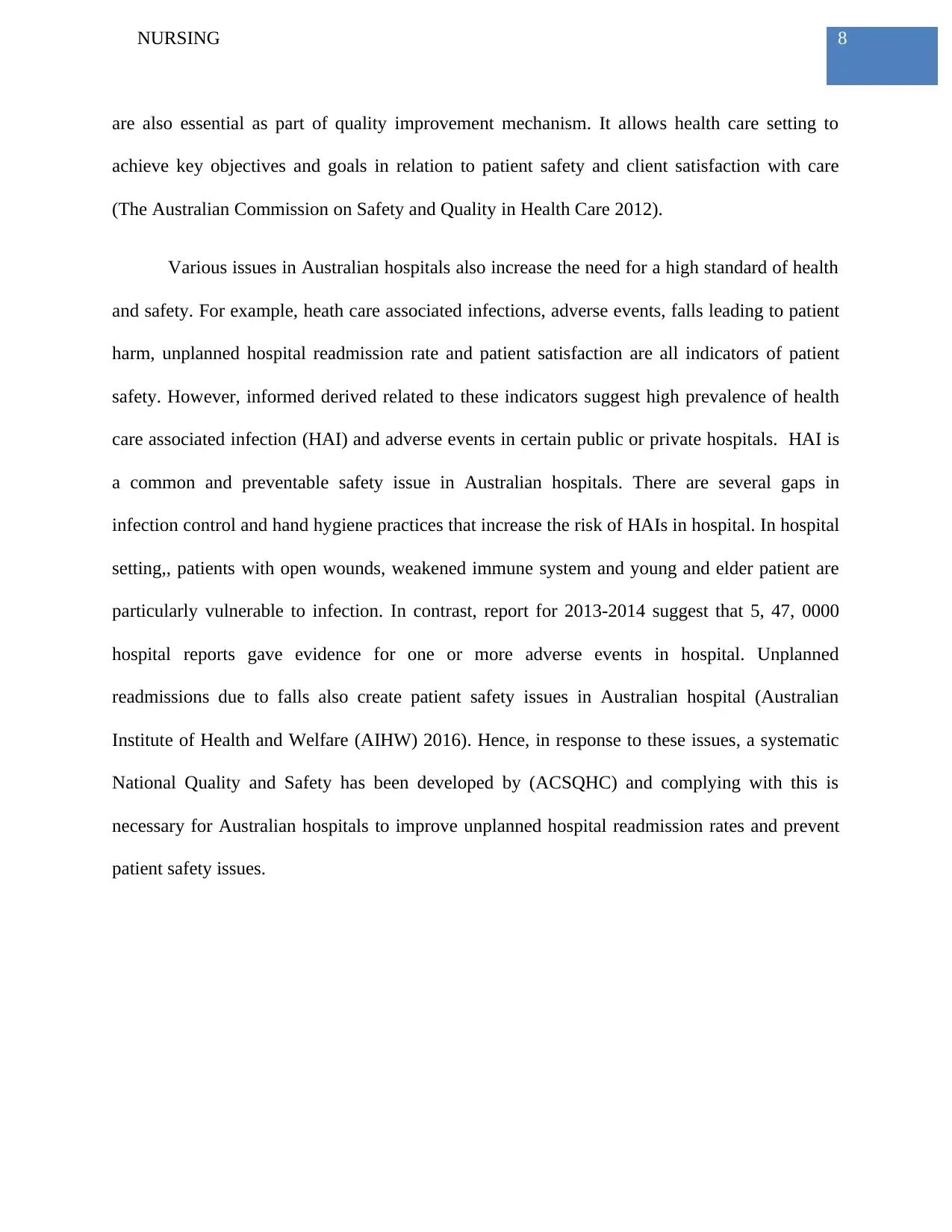
8NURSING
are also essential as part of quality improvement mechanism. It allows health care setting to
achieve key objectives and goals in relation to patient safety and client satisfaction with care
(The Australian Commission on Safety and Quality in Health Care 2012).
Various issues in Australian hospitals also increase the need for a high standard of health
and safety. For example, heath care associated infections, adverse events, falls leading to patient
harm, unplanned hospital readmission rate and patient satisfaction are all indicators of patient
safety. However, informed derived related to these indicators suggest high prevalence of health
care associated infection (HAI) and adverse events in certain public or private hospitals. HAI is
a common and preventable safety issue in Australian hospitals. There are several gaps in
infection control and hand hygiene practices that increase the risk of HAIs in hospital. In hospital
setting,, patients with open wounds, weakened immune system and young and elder patient are
particularly vulnerable to infection. In contrast, report for 2013-2014 suggest that 5, 47, 0000
hospital reports gave evidence for one or more adverse events in hospital. Unplanned
readmissions due to falls also create patient safety issues in Australian hospital (Australian
Institute of Health and Welfare (AIHW) 2016). Hence, in response to these issues, a systematic
National Quality and Safety has been developed by (ACSQHC) and complying with this is
necessary for Australian hospitals to improve unplanned hospital readmission rates and prevent
patient safety issues.
are also essential as part of quality improvement mechanism. It allows health care setting to
achieve key objectives and goals in relation to patient safety and client satisfaction with care
(The Australian Commission on Safety and Quality in Health Care 2012).
Various issues in Australian hospitals also increase the need for a high standard of health
and safety. For example, heath care associated infections, adverse events, falls leading to patient
harm, unplanned hospital readmission rate and patient satisfaction are all indicators of patient
safety. However, informed derived related to these indicators suggest high prevalence of health
care associated infection (HAI) and adverse events in certain public or private hospitals. HAI is
a common and preventable safety issue in Australian hospitals. There are several gaps in
infection control and hand hygiene practices that increase the risk of HAIs in hospital. In hospital
setting,, patients with open wounds, weakened immune system and young and elder patient are
particularly vulnerable to infection. In contrast, report for 2013-2014 suggest that 5, 47, 0000
hospital reports gave evidence for one or more adverse events in hospital. Unplanned
readmissions due to falls also create patient safety issues in Australian hospital (Australian
Institute of Health and Welfare (AIHW) 2016). Hence, in response to these issues, a systematic
National Quality and Safety has been developed by (ACSQHC) and complying with this is
necessary for Australian hospitals to improve unplanned hospital readmission rates and prevent
patient safety issues.
⊘ This is a preview!⊘
Do you want full access?
Subscribe today to unlock all pages.

Trusted by 1+ million students worldwide
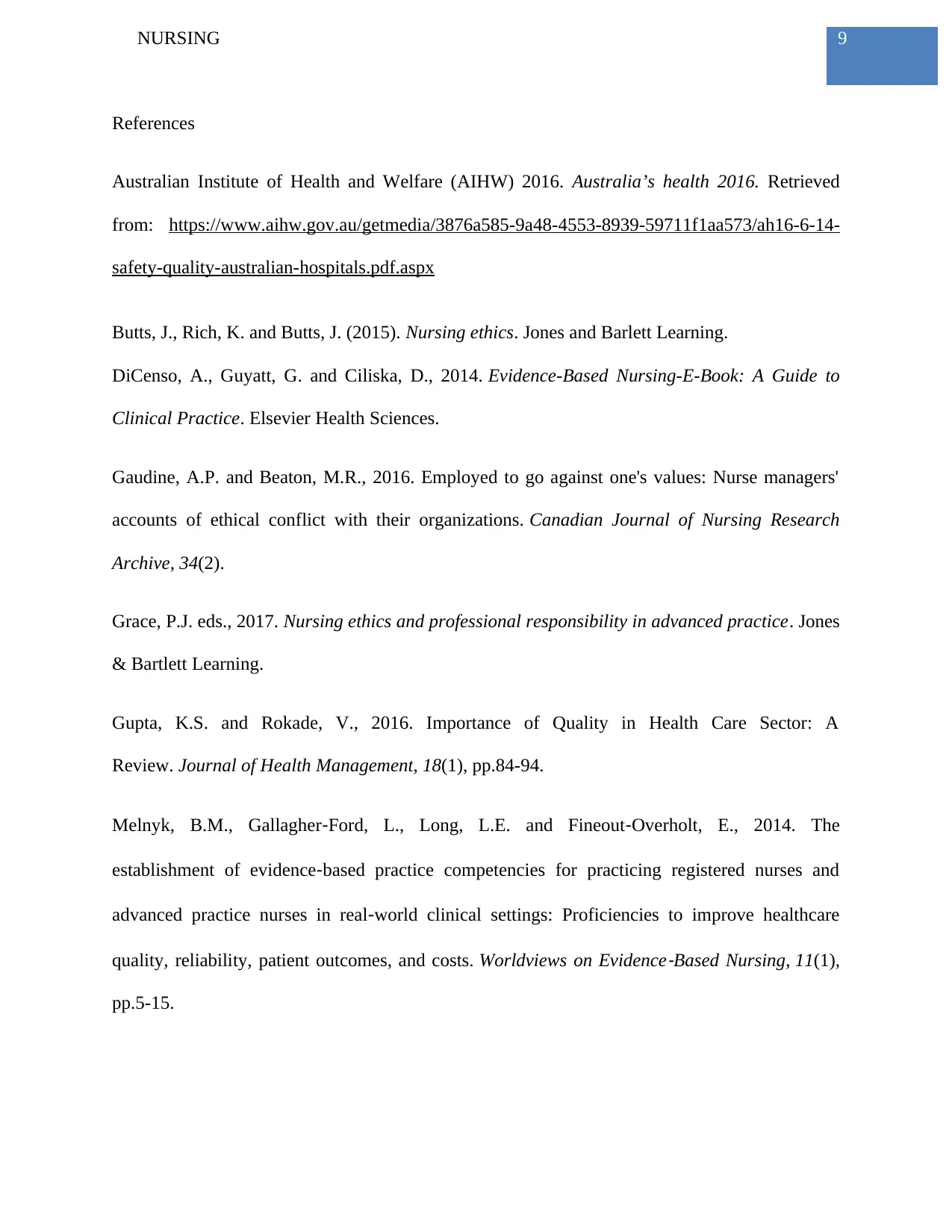
9NURSING
References
Australian Institute of Health and Welfare (AIHW) 2016. Australia’s health 2016. Retrieved
from: https://www.aihw.gov.au/getmedia/3876a585-9a48-4553-8939-59711f1aa573/ah16-6-14-
safety-quality-australian-hospitals.pdf.aspx
Butts, J., Rich, K. and Butts, J. (2015). Nursing ethics. Jones and Barlett Learning.
DiCenso, A., Guyatt, G. and Ciliska, D., 2014. Evidence-Based Nursing-E-Book: A Guide to
Clinical Practice. Elsevier Health Sciences.
Gaudine, A.P. and Beaton, M.R., 2016. Employed to go against one's values: Nurse managers'
accounts of ethical conflict with their organizations. Canadian Journal of Nursing Research
Archive, 34(2).
Grace, P.J. eds., 2017. Nursing ethics and professional responsibility in advanced practice. Jones
& Bartlett Learning.
Gupta, K.S. and Rokade, V., 2016. Importance of Quality in Health Care Sector: A
Review. Journal of Health Management, 18(1), pp.84-94.
Melnyk, B.M., Gallagher‐Ford, L., Long, L.E. and Fineout‐Overholt, E., 2014. The
establishment of evidence‐based practice competencies for practicing registered nurses and
advanced practice nurses in real‐world clinical settings: Proficiencies to improve healthcare
quality, reliability, patient outcomes, and costs. Worldviews on Evidence
‐Based Nursing, 11(1),
pp.5-15.
References
Australian Institute of Health and Welfare (AIHW) 2016. Australia’s health 2016. Retrieved
from: https://www.aihw.gov.au/getmedia/3876a585-9a48-4553-8939-59711f1aa573/ah16-6-14-
safety-quality-australian-hospitals.pdf.aspx
Butts, J., Rich, K. and Butts, J. (2015). Nursing ethics. Jones and Barlett Learning.
DiCenso, A., Guyatt, G. and Ciliska, D., 2014. Evidence-Based Nursing-E-Book: A Guide to
Clinical Practice. Elsevier Health Sciences.
Gaudine, A.P. and Beaton, M.R., 2016. Employed to go against one's values: Nurse managers'
accounts of ethical conflict with their organizations. Canadian Journal of Nursing Research
Archive, 34(2).
Grace, P.J. eds., 2017. Nursing ethics and professional responsibility in advanced practice. Jones
& Bartlett Learning.
Gupta, K.S. and Rokade, V., 2016. Importance of Quality in Health Care Sector: A
Review. Journal of Health Management, 18(1), pp.84-94.
Melnyk, B.M., Gallagher‐Ford, L., Long, L.E. and Fineout‐Overholt, E., 2014. The
establishment of evidence‐based practice competencies for practicing registered nurses and
advanced practice nurses in real‐world clinical settings: Proficiencies to improve healthcare
quality, reliability, patient outcomes, and costs. Worldviews on Evidence
‐Based Nursing, 11(1),
pp.5-15.
Paraphrase This Document
Need a fresh take? Get an instant paraphrase of this document with our AI Paraphraser
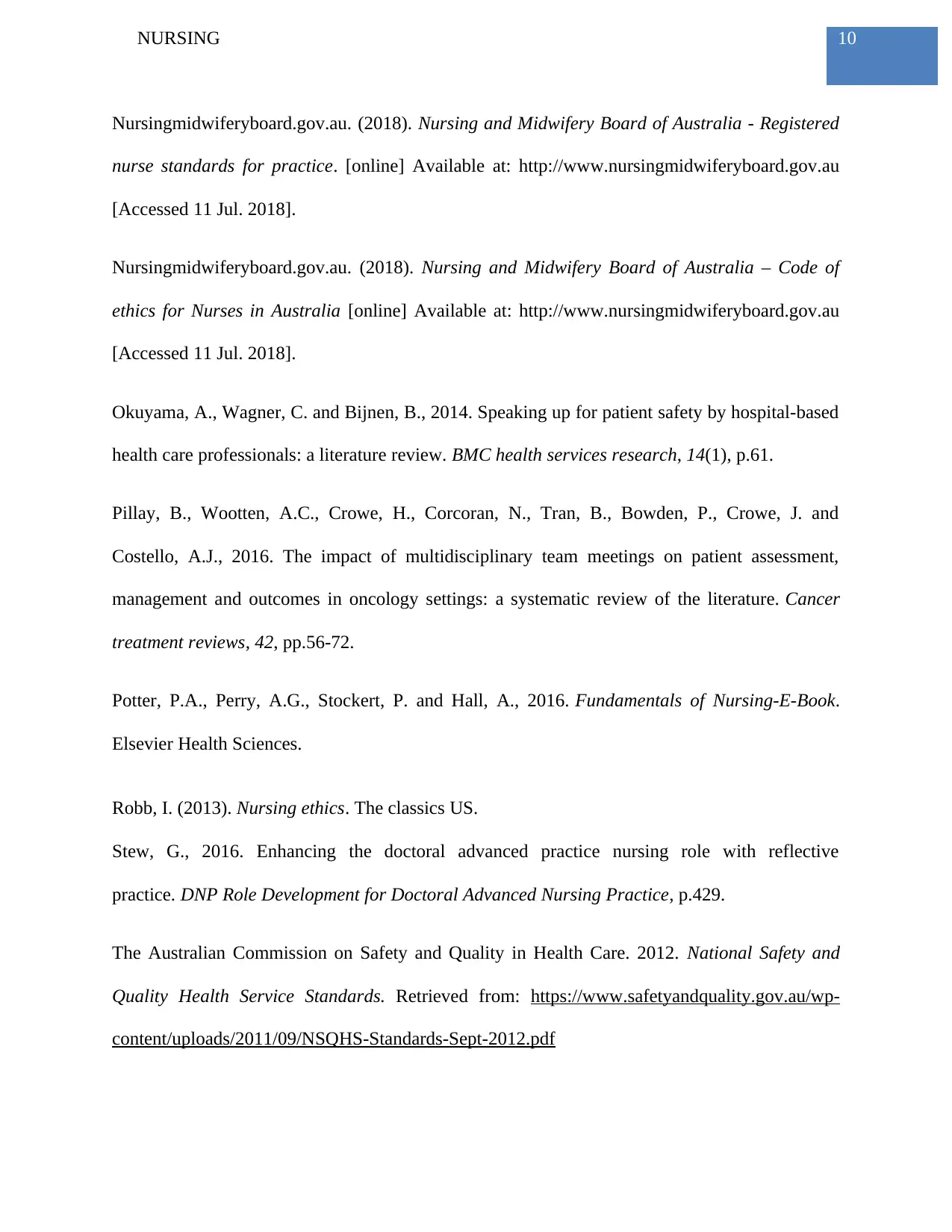
10NURSING
Nursingmidwiferyboard.gov.au. (2018). Nursing and Midwifery Board of Australia - Registered
nurse standards for practice. [online] Available at: http://www.nursingmidwiferyboard.gov.au
[Accessed 11 Jul. 2018].
Nursingmidwiferyboard.gov.au. (2018). Nursing and Midwifery Board of Australia – Code of
ethics for Nurses in Australia [online] Available at: http://www.nursingmidwiferyboard.gov.au
[Accessed 11 Jul. 2018].
Okuyama, A., Wagner, C. and Bijnen, B., 2014. Speaking up for patient safety by hospital-based
health care professionals: a literature review. BMC health services research, 14(1), p.61.
Pillay, B., Wootten, A.C., Crowe, H., Corcoran, N., Tran, B., Bowden, P., Crowe, J. and
Costello, A.J., 2016. The impact of multidisciplinary team meetings on patient assessment,
management and outcomes in oncology settings: a systematic review of the literature. Cancer
treatment reviews, 42, pp.56-72.
Potter, P.A., Perry, A.G., Stockert, P. and Hall, A., 2016. Fundamentals of Nursing-E-Book.
Elsevier Health Sciences.
Robb, I. (2013). Nursing ethics. The classics US.
Stew, G., 2016. Enhancing the doctoral advanced practice nursing role with reflective
practice. DNP Role Development for Doctoral Advanced Nursing Practice, p.429.
The Australian Commission on Safety and Quality in Health Care. 2012. National Safety and
Quality Health Service Standards. Retrieved from: https://www.safetyandquality.gov.au/wp-
content/uploads/2011/09/NSQHS-Standards-Sept-2012.pdf
Nursingmidwiferyboard.gov.au. (2018). Nursing and Midwifery Board of Australia - Registered
nurse standards for practice. [online] Available at: http://www.nursingmidwiferyboard.gov.au
[Accessed 11 Jul. 2018].
Nursingmidwiferyboard.gov.au. (2018). Nursing and Midwifery Board of Australia – Code of
ethics for Nurses in Australia [online] Available at: http://www.nursingmidwiferyboard.gov.au
[Accessed 11 Jul. 2018].
Okuyama, A., Wagner, C. and Bijnen, B., 2014. Speaking up for patient safety by hospital-based
health care professionals: a literature review. BMC health services research, 14(1), p.61.
Pillay, B., Wootten, A.C., Crowe, H., Corcoran, N., Tran, B., Bowden, P., Crowe, J. and
Costello, A.J., 2016. The impact of multidisciplinary team meetings on patient assessment,
management and outcomes in oncology settings: a systematic review of the literature. Cancer
treatment reviews, 42, pp.56-72.
Potter, P.A., Perry, A.G., Stockert, P. and Hall, A., 2016. Fundamentals of Nursing-E-Book.
Elsevier Health Sciences.
Robb, I. (2013). Nursing ethics. The classics US.
Stew, G., 2016. Enhancing the doctoral advanced practice nursing role with reflective
practice. DNP Role Development for Doctoral Advanced Nursing Practice, p.429.
The Australian Commission on Safety and Quality in Health Care. 2012. National Safety and
Quality Health Service Standards. Retrieved from: https://www.safetyandquality.gov.au/wp-
content/uploads/2011/09/NSQHS-Standards-Sept-2012.pdf
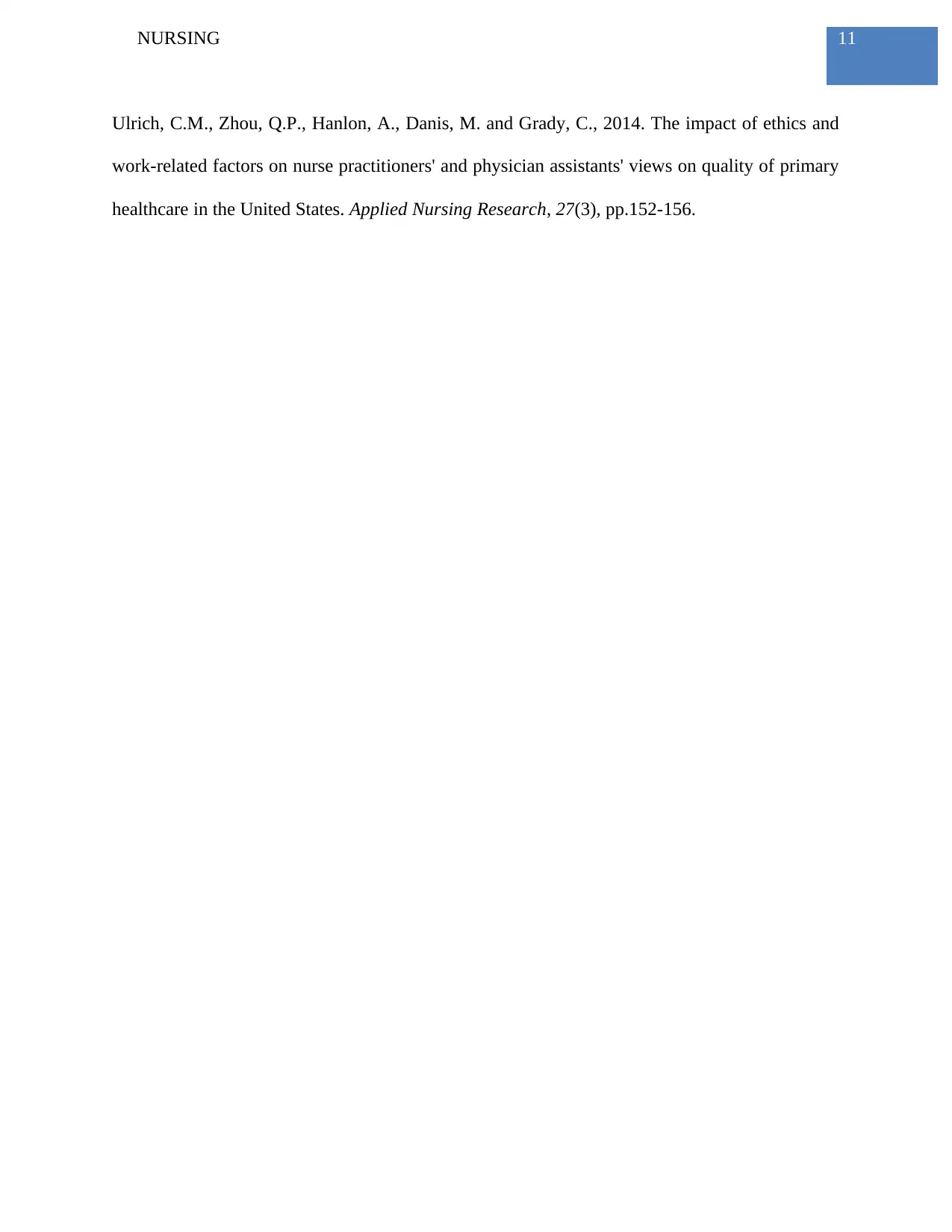
11NURSING
Ulrich, C.M., Zhou, Q.P., Hanlon, A., Danis, M. and Grady, C., 2014. The impact of ethics and
work-related factors on nurse practitioners' and physician assistants' views on quality of primary
healthcare in the United States. Applied Nursing Research, 27(3), pp.152-156.
Ulrich, C.M., Zhou, Q.P., Hanlon, A., Danis, M. and Grady, C., 2014. The impact of ethics and
work-related factors on nurse practitioners' and physician assistants' views on quality of primary
healthcare in the United States. Applied Nursing Research, 27(3), pp.152-156.
⊘ This is a preview!⊘
Do you want full access?
Subscribe today to unlock all pages.

Trusted by 1+ million students worldwide
1 out of 12
Related Documents
Your All-in-One AI-Powered Toolkit for Academic Success.
+13062052269
info@desklib.com
Available 24*7 on WhatsApp / Email
![[object Object]](/_next/static/media/star-bottom.7253800d.svg)
Unlock your academic potential
Copyright © 2020–2026 A2Z Services. All Rights Reserved. Developed and managed by ZUCOL.





